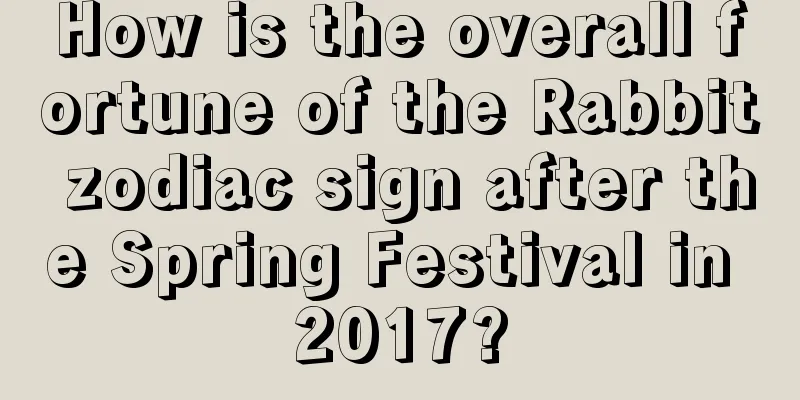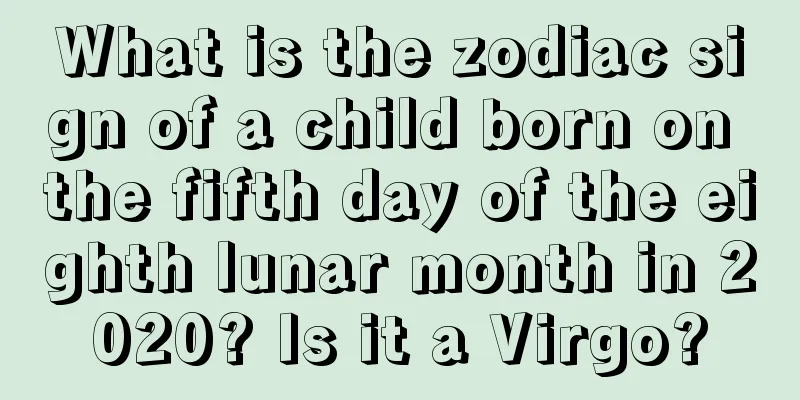Why are images of Zhong Kui hung during the Dragon Boat Festival? What other customs are there during the Dragon Boat Festival?

|
Introduction: The Dragon Boat Festival is known as the first of the nine poisonous days, so there are many things to pay attention to when celebrating the Dragon Boat Festival. So why do we hang up the image of Zhong Kui during the Dragon Boat Festival? What other customs are there during the Dragon Boat Festival? The fifth month of the lunar calendar is a beautiful time as described by the ancients: "The ground is covered with shade from the trees, the sun is at noon, and I wake up from my dream by the sound of a nightingale." For more information about the auspicious and inauspicious days in the fifth month of the lunar calendar in 2019, please visit Mr. Shuimo's website. Why do we hang the image of Zhong Kui during the Dragon Boat Festival? Zhong Kui catching ghosts is a custom of the Dragon Boat Festival. In the Jianghuai region, every household hangs an image of Zhong Kui to ward off evil spirits. During the Kaiyuan period of the Tang Dynasty, Emperor Minghuang returned to the palace after giving a military lecture at Mount Li. He suffered from a severe malaria attack and dreamed of two ghosts, one big and one small. The small ghost wore bright red crotchless pants and they stole the sachet of Yang Guifei and the emperor's jade flute and ran around the palace. The big ghost, wearing a blue robe and a hat, caught the little ghost, dug out its eyes, and swallowed it in one gulp. The emperor asked the ghost, and the ghost replied: My surname is Zhong Kui, and I failed the martial arts examination. But I am willing to eliminate demons for your majesty. After the emperor woke up, his malaria was cured. So he ordered the painter Wu Daozi to paint a picture of Zhong Kui catching ghosts according to what he saw in the dream, and ordered the whole country to post it during the Dragon Boat Festival to drive away evil spirits. What other customs are there for the Dragon Boat Festival?Other customs of the Dragon Boat Festival: Eating Zongzi during the Dragon Boat FestivalEating rice dumplings during the Dragon Boat Festival is another traditional custom of the Chinese people. Zongzi is also called "jiaoshu" and "tongzong". It has a long history and comes in many forms. On the morning of the Dragon Boat Festival, every family eats rice dumplings to commemorate Qu Yuan. Generally, the rice dumplings are wrapped the day before, cooked at night, and eaten in the morning. The main material used to wrap zongzi is reed leaves, which are the tender grass that grows abundantly by rivers and ponds. In some areas, bamboo leaves are also used. They are collectively called zong leaves. The traditional form of zongzi is triangular and is generally named according to the filling inside. The one filled with glutinous rice is called rice zongzi, the one with red beans mixed in the rice is called red bean zongzi, and the one with red dates mixed in is called date zongzi. They are collectively called glutinous rice zongzi. The homonym of "jujube rice dumpling" is "zaozhong", so the most popular food is jujube rice dumpling, with the belief that children who study hard can get the top score in the imperial examination soon after eating it. In the past, scholars would eat jujube-filled rice dumplings in the morning on the day of the imperial examination. Even today, some parents still make jujube-filled rice dumplings for candidates to eat on the morning of middle school and university entrance examinations. Other customs of the Dragon Boat Festival: hanging wormwood Mugwort, calamus and garlic are known as the "Three Friends of the Dragon Boat Festival". During the Northern and Southern Dynasties, the Dragon Boat Festival was also called the "Mu Lan Festival", and there was a custom of picking mugwort in the Jingchu area. People have to start picking mugwort before the rooster crows. They pick the mugwort that looks most like a human and take it back to hang on the door. Some people even tie the mugwort into the shape of a tiger and then stick mugwort leaves on it. Mugwort and calamus contain aromatic oils, which, like garlic, have antibacterial effects. During the Dragon Boat Festival, it is close to the summer solstice, which is the time when cold and hot air alternate. You need to be careful about everything from diet to clothing and behavior. There is a saying in Baoshan County: "Before eating the Dragon Boat Festival rice dumplings, you can't send winter clothes; after eating the Dragon Boat Festival rice dumplings, you still have to suffer from the three colds." In ancient times, people lacked scientific concepts and mistakenly believed that diseases were caused by evil spirits. Therefore, on the Dragon Boat Festival, people used calamus as swords, mugwort as whips, and garlic as hammers, which are also called "three weapons", and believed that they could repel snakes, insects, germs, and kill demons. Other customs of the Dragon Boat Festival: hanging purses and tying five-colored silk threads Ying Shao's "Customs and Customs" records: "On May 5th, people tie colorful silk on their arms, which is called the long life thread, also known as the life-extending thread, the war-avoiding thread, the five-color thread, and the red rope. It can ward off soldiers and ghosts and prevent people from getting plague." In ancient China, people revered the five colors and regarded them as auspicious colors. Therefore, on the morning of the festival, the first thing adults do after getting up is to tie five-colored threads on their children’s wrists, ankles, and necks. Children are forbidden to speak when the string is being tied. The five-colored thread cannot be broken or discarded at will and can only be thrown into the river during the first heavy rain in summer or the first bath. It is said that children wearing five-colored threads can avoid being harmed by poisonous snakes, scorpions and other insects; throwing them into the river means letting the river water wash away the plague and disease, so that the children can stay healthy. Other customs of the Dragon Boat Festival: Dragon Boat Racing Dragon boat racing is the main custom of the Dragon Boat Festival. According to legend, it originated from the ancient Chu people who were reluctant to see the virtuous minister Qu Yuan commit suicide by jumping into the river, so many people rowed boats to chase him and save him. They rushed after him, but when they reached Dongting Lake, he disappeared. Since then, dragon boat races have been held every year on May 5th to commemorate this event. Dragon boat racing is used to drive away the fish in the river to prevent them from eating Qu Yuan's body. The custom of racing boats was popular in Wu, Yue and Chu. In fact, "Dragon Boat Racing" has existed as early as the Warring States Period. Rowing canoes carved into the shape of dragons to the sound of rapid drums and racing to entertain the gods and the people is a semi-religious, semi-entertaining program in the ritual. Other customs of the Dragon Boat Festival: drinking cattail wine, realgar wine, and cinnabar wine Drink Pu wine, realgar wine, and cinnabar wine, and spray with the wine. "Jingchu Sui Shi Ji" records: "Use calamus (a perennial herb that grows by the water, with light red rhizomes underground, sword-shaped leaves, and fleshy spadix inflorescences. The rhizomes can be used as spices and medicine) either carved or shredded, and add to cold wine." Calamus wine has a fragrant and refreshing taste. Later, realgar, cinnabar, etc. were added to the wine. In Ming Dynasty's "Wu Za Ju", Xie Zhaozhe wrote: "Drink calamus wine... and add realgar to the wine and drink it." In Ming Dynasty's "Yueling Guangyi", Feng Yingjing wrote: "Use cinnabar wine on the fifth day to ward off evil spirits and detoxify. Use wine to stain the forehead, chest, hands and soles of feet to avoid the trouble of vipers (a kind of poisonous snake mentioned in ancient books). Also sprinkle the walls, doors and windows to avoid poisonous insects." This custom is quite widespread. To this day, in places like Binyang, Guangxi, bags of medicinal materials are sold during the Dragon Boat Festival, including realgar, calamus, cypress seeds, peach kernels, cattail leaves, mugwort, etc. People soak them in wine and then sprinkle them with calamus and mugwort on the corners of walls, doors and windows, under the bed, etc., and then use wine to apply on children's ears, noses, and navels to drive away poisonous insects and pray for the children's safety. In addition, in some areas, people use realgar wine powder to draw the word "王" on children's foreheads, so that the children bear the mark of a tiger and use the tiger to ward off evil spirits. From a health perspective, these activities make scientific sense. Realgar, water and wine can be added to the realgar and sprinkled indoors to disinfect and kill bacteria. Drinking cattail spray is also quite beneficial. The new year of 2019 has already begun. Will you be able to find your soulmate this year? Is your love luck good? Welcome to click on the "Premium Calculation" below to accurately calculate your love pattern. I wish you can find the right soulmate soon! |
<<: Can’t we have sex during the Dragon Boat Festival? What does Guining mean?
>>: Where is the direction of the God of Happiness on April 29, 2019?
Recommend
Is February 12th of the lunar calendar 2020 a good date? Is it suitable to pick up the car?
The arrival of the apricot moon paints the earth ...
What are the do's and don'ts on the 15th day of the second lunar month in 2018?
Spring is a season of vitality and revival, but t...
How many days are there in the ninth month of the lunar calendar? Selection of auspicious days in September of the lunar calendar 2021
Different days have different good and bad fortune...
Is it taboo to repair graves on the ninth day of the twelfth lunar month, the day after Laba Festival in 2019? What day of the week is Laba Festival in 2020?
Introduction: Generally, it is necessary to choose...
How many days are there in the sixth lunar month? Is the lunar calendar the same as the solar calendar?
Speaking of the lunar months, I believe many of my...
What day is March 14th in the lunar calendar in 2019? What month and date is it?
How much do you know about the third month of the...
Is it possible to move house on May 14th of the lunar calendar in 2018?
The fifth month of the lunar calendar has the ind...
Query of auspicious times and inauspicious times for September 20, 2018
Mr. Shui Mo has carefully compiled detailed infor...
Is it possible to get engaged or married on September 12 of the lunar calendar in 2018?
The ninth month of the lunar calendar this year i...
Is the sixth day of the ninth lunar month in 2018 a good day to pray?
Is the sixth day of the ninth lunar month in 2018 ...
What is the lunar calendar for April 29th, 2022? Can we start work?
April is the fourth month of the lunar calendar an...
Is it a good fortune for a baby boy to be born on the third day of the sixth lunar month in 2022?
Is it a good fortune for a baby boy to be born on ...
What are the appropriate gifts for boyfriends and girlfriends to give to each other during the Mid-Autumn Festival? How should mooncakes be eaten?
The Mid-Autumn Festival is one of China's trad...
What are the auspicious days for opening a business in August of the lunar calendar in 2019?
Choosing an auspicious day is a process that Chine...
What are the do’s and don’ts on July 17th of the lunar calendar 2019?
July is already halfway through, let’s take a loo...









